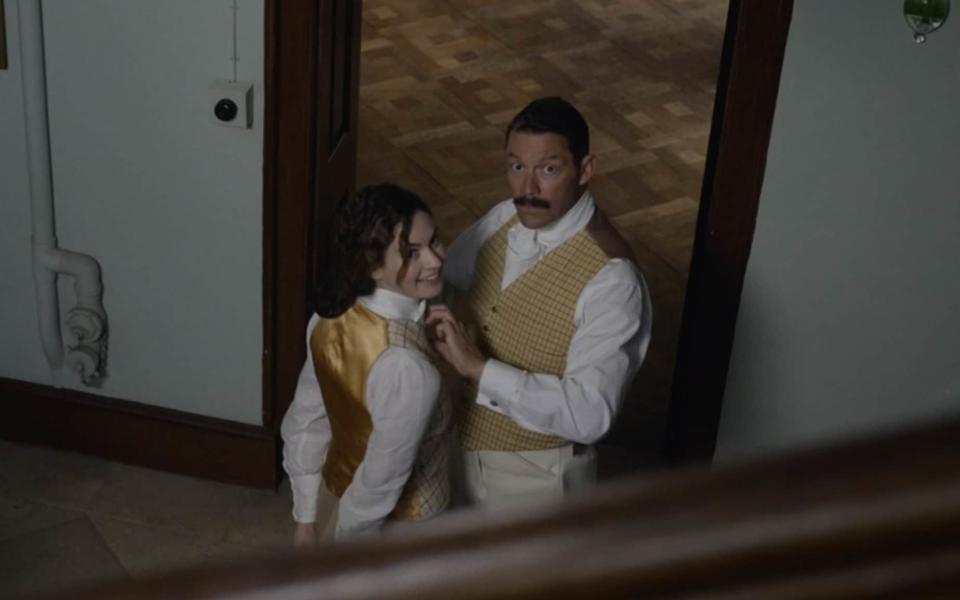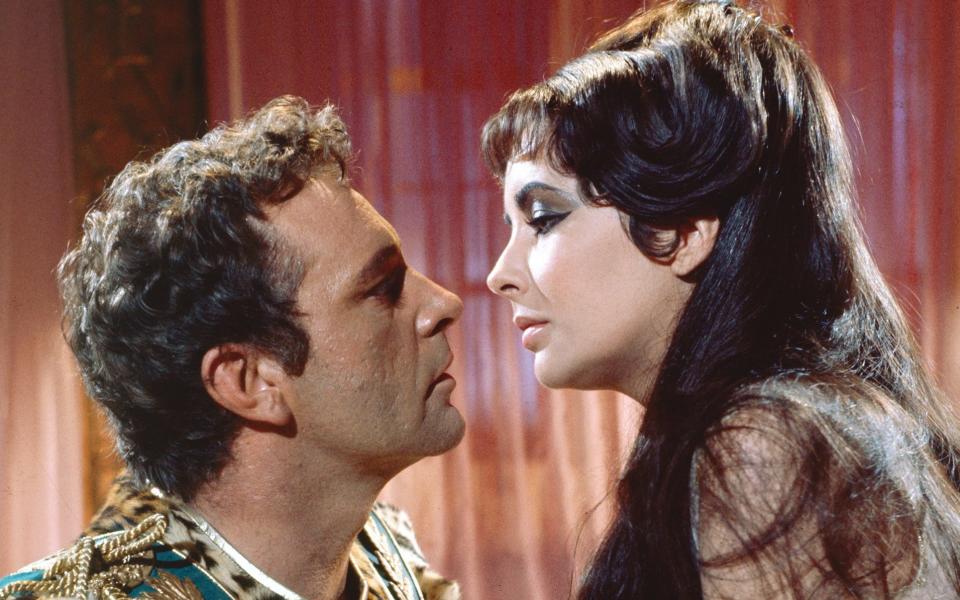Lily James and Dominic West are proof off-screen chemistry always ruins the on-screen action

Any soul watching the BBC’s new rendering of The Pursuit of Love for a frisson of sexual desire between Dominic West, who plays Uncle Matthew, and Lily James, his on-screen daughter Linda (they were rumoured to have had a brief affair until the tabloids consumed them) should firstly be ashamed of themselves, and, secondly, will be otherwise disappointed.
I suspect that at heart Uncle Matthew has shell shock from the war – what would a younger Anthony Hopkins do with the part? – but West plays him for laughs because Nancy Mitford wrote him that way, and it is easier work. In his scenes with Lily James, who is full of sensibility and longing, he merely smirks, much as he did during the gruesome post-exposure photocall with his wife.
Where is his bass note? West is a likeable actor – he is all shoulders and grins – but he is not a great one. If there was any emotional dribble from his personal conflicts, it made his performance worse. Uncle Matthew is a raging and uxorious man; West plays him as pleased with himself, while being a depressive, and it does not make sense.
There are two performances in The Pursuit of Love that shine with sexual repression. One is Emily Mortimer as Linda’s aunt and warning from history, the Bolter, who today would be called a sex and love addict. Mortimer directed The Pursuit of Love, and is both responsible for its female gaze, and one of the best things in it. You can’t hate the Bolter – she lives in an ever-receding dreamland – and in Mortimer’s hands she is fragile, heartbreaking and very funny.
The other is the superb Andrew Scott as the presumably gay Lord Merlin, the neighbour who tries to educate and protect Linda from herself. He is brittle and tender; grey and colourful; stone and water. Since we should assume that Mortimer and Scott weren’t chewing each other up offscreen, the idea that an affair will enhance a performance is as dead as Uncle Matthew’s unfortunate pheasants.
Film history teaches us that. The canny Hollywood actress of the Golden Age would not embrace her leading man – though Joan Crawford was notorious for it - but instead her lighting or cameraman, who offered far better returns.
Bette Davis fell in love with her on-screen lover Gary Merrill when she played Margo Channing in All About Eve (1950). It’s a marvellous performance in an almost-perfect film, and yet the only thing I don’t believe in it is that Margo would love anyone as boring as Bill. (Off-screen, they were married for a decade.)
Paul Newman and Joanne Woodwood were married for 50 years, and appeared together in The Long, Hot Summer (1958). It’s a pleasing film – even if it’s hard to imagine Newman as a friendless drifter – though the eroticism was easily outclassed by Cat on a Hot Tin Roof (also 1958), in which Newman played alongside Elizabeth Taylor: that is a relationship to believe in, even if he is called Brick.
Taylor is the lodestar of this gruesome sub-genre of film criticism (properly called gawping, or loneliness): a whole industry sprung up for fans to imagine themselves inside her relationship with her (two-time) husband Richard Burton, which began on the set of the ruinous Cleopatra (1963).
“I want to be free of you, of wanting you, of being afraid,” he tells her, as Mark Anthony, while she gives a Dominic West-style smirk under her appalling wig. She looks like what she is: a woman knowing they would meet at dinner in 1963, very far from Egypt in the days of empire.
It helped the marketing department. It did not help the film. When Taylor saw it, she cried.

Their performances in The Taming of the Shrew (1967) were equally, if not more, awful; the VIPs (1963) is merely muted, but it is set in an airport, and departure lounges can do that. I didn’t watch Dr Faustus (1967), or Boom! (1968). The reviews forbade it. Separately, they could be superb. Together, less so.
I wonder if, when actors love each other, their performances dull? Happiness is rarely interesting, but ambivalence – as Andrew Scott and Emily Mortimer showed us – is. When coupled-up actors combust, though, the performances brighten. (I am sorry to speak of them as toys, but they invite it.) Burton and Taylor were terrible as lovers, brilliant as haters. Their finest film together was Who’s Afraid of Virginia Woolf? (1966) and it remains one of the best portraits of a disintegrating marriage on screen. That, I believed.
The same dynamic worked – or didn’t work – for Woody Allen and Mia Farrow, who had the misfortune to be his partner and muse. Farrow is a one-note actress, projecting the decency she is grasping for in life, and he is no actor at all. He is the worst thing in all his films as he lies about being a romantic; retrospectively, they fall from art to a drama –documentary on male deception. Farrow is merely a blur of victimhood in most of their films together.
In Husbands and Wives (1992), though, the film they made when Farrow knew that Allen was sleeping with her adopted daughter, she manages, amid exhaustion, a glimpse of pure loathing. It is a rabbit’s loathing – it is swiftly put away - but it is there. It is her finest moment on screen (if one for the film nerds).
Our projection onto actors – onto vessels – is greedy and self-hating. Drama is a trade, like any other – some tradesmen are good, some bad – and to make them gods is absurd and deeply unfair to them. We belong in their stories, but not in their lives: don’t we have our own? If you seek some deeper meaning in The Pursuit of Love, you won’t find it in gossip. It’s a MacGuffin – a sort of Keyser Söze of sex – signifying nothing more than our inability to switch off the screen when the show is over.

